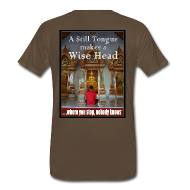
Reading this the other day, and I finally realized the real importance of virtue in keeping you from creating more misery for yourself. If you lie to others like in his example, which I happily avoid as much as possible, you are really lying to yourself. Lying to yourself puts wisdom that much further from you. I have not lied like this, but I know I have criticized others or made jokes with the underlying reason to harm, even if only in words. Do I feel good afterward, or better yet does it elevate the sense of myself by knocking down others? It really doesn’t and sets me up for more trouble. Enlightenment comes in the awareness of everything you do and say. The more present you are, the less you feel the need to lie to yourself, about who or what you are. Virtue comes more natural when you take life as it is ….good and bad, instead of feeling like you can change it.











No comments:
Post a Comment